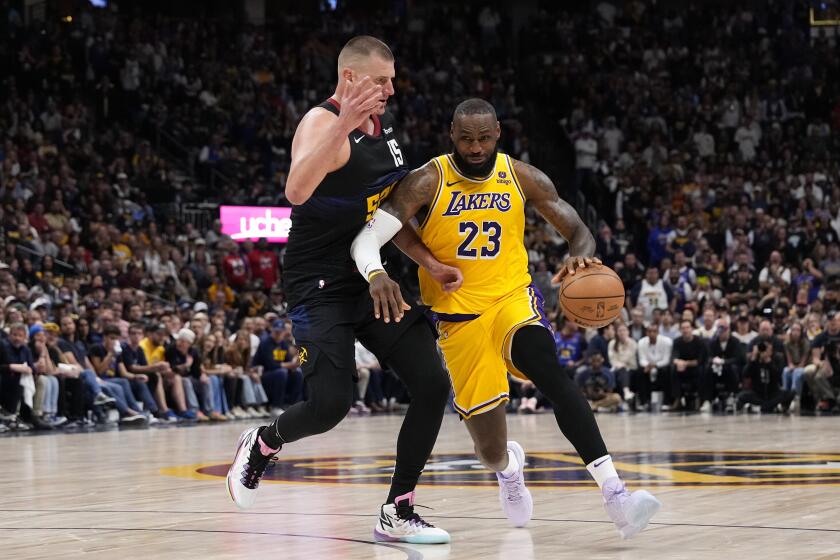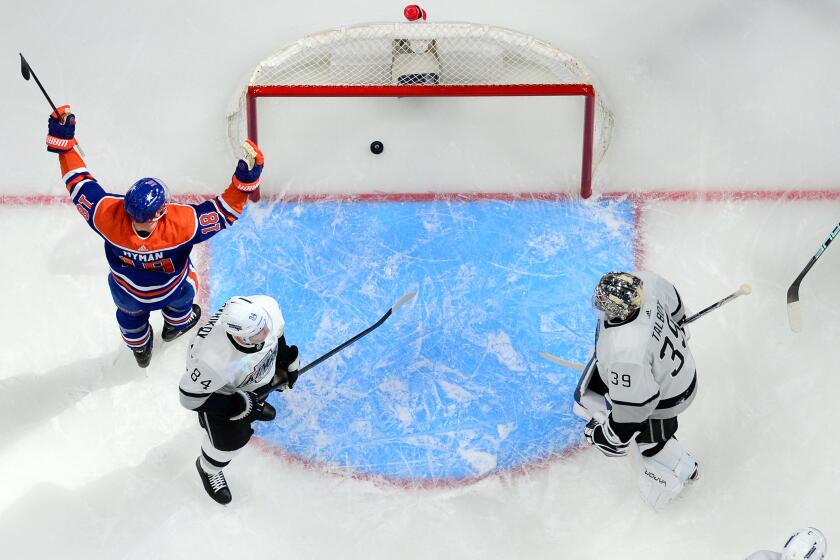Few new details in Dodgers’ sale court documents
The much-anticipated and voluminous sales agreement in which Guggenheim Baseball Management agreed to purchase the Dodgers from Frank McCourt managed to reveal little that wasn’t already known about the deal.
The agreement, filed Friday in U.S. Bankruptcy Court, spanned 70 pages but did not explain Guggenheim’s financing. Nor did it detail the arrangement by which the Dodger Stadium parking lots would be owned and operated, or explain what McCourt’s involvement would be.
The $2.15-billion sale, a record for a sports franchise, included $150 million for a joint venture between the buyers and McCourt to run the parking lots. However, because the McCourt entity that controls the lots was not part of the bankruptcy filing, the Dodgers declined to explain — to the court, to baseball officials or ultimately to fans — how the parking lot arrangement would work and what role McCourt would play in it.
“As these agreements do not involve the debtors or their property, they are not included here,” the Dodgers said in filing the sale agreement.
A spokesman for Guggenheim declined to comment, saying public discussion was not permitted until the deal closes.
Portions of the agreement were blacked out. The redactions included several financial figures, including estimated revenue to be received by Major League Baseball and pension fund liabilities. One entire section of the agreement was hidden, along with one of the nine exhibits attached to it.
Another redacted phrase followed a description of Guggenheim chief executive Mark Walter as the MLB Control Person for the Club. It appeared to refer to Walter’s role in another venture, but that was impossible to verify.
MLB officials are frustrated that more information about the deal’s structure has not been made available to them and are working to obtain more details, according to a person with knowledge of the situation who was not authorized to speak publicly. However, MLB does not appear to have any grounds to derail the sale, according to people familiar with the process.
The agreement is expected to be approved by U.S. Bankruptcy Judge Kevin Gross at an April 13 hearing.
The league generally has the final say over a franchise sale. However, in order to get McCourt to sell the Dodgers, the league agreed to preapprove a number of bidders and let McCourt pick the winner, with the process overseen by a court-appointed mediator.
McCourt would take home $1.588 billion from the sale while leaving the new buyers to inherit $412 million in team debt, according to Friday’s filings.
MLB owners approved the Guggenheim bid, and that of two other finalists, on a 30-0 vote early last week. The group at that point had offered about $1.6 billion, and the league had reserved the right to review the financial structure of any group whose offer was raised substantially in the final bidding.
Although Guggenheim raised its bid by $500 million, the basic terms of the deal that the league had already approved did not change. That is, there are no new investors, and there is no added debt. The bid remains all cash except for assumption of the Dodgers’ current debts.
Although the Guggenheim group is fronted by Magic Johnson, the public face and voice of the partnership, he was not listed as an officer of any of the Dodgers’ enterprises. Stan Kasten was identified as incoming Dodgers president and Walter as the Dodgers’ controlling owner.
The sale agreement requires McCourt and Dodgers vice chairman Jeff Ingram to resign, though some team executives retain their positions, including General Manager Ned Colletti and treasurer and chief financial officer Peter Wilhelm.
The agreement forbids the buyers from “speech that disparages, criticizes or is injurious to the reputation of” McCourt — and McCourt from disparaging the Dodgers or buyers.
In urging Gross to overrule any objections and approve the sale, Dodgers attorneys called the deal “a remarkable outcome,” noting the team filed for bankruptcy because it did not have the cash to meet a payroll three days away.
The sale is scheduled to close April 30, the same day McCourt must pay his ex-wife Jamie $131 million in a divorce settlement.
Jamie McCourt had asked the court to consider whether she could stake a claim to the sale proceeds rather than wait for her ex-husband to pay her directly. In Friday’s filing, the Dodgers said they since had proposed letting Guggenheim wire her the money directly at closing, sparing Frank McCourt from what his attorneys called “unnecessary controversy.”
After payment of the divorce settlement and repayment of a $150-million bankruptcy financing loan to MLB, McCourt would have about $1.3 billion. After taxes, legal fees and other obligations, McCourt is expected to clear close to $1 billion on the sale of a team he bought for $421 million in 2004.
If the sale closes as expected, the Guggenheim group would take over the Dodgers on May 1, and the team would have emerged from bankruptcy in 10 months.
McCourt took the team into bankruptcy last June, claiming he was forced to do so after baseball Commissioner Bud Selig rejected a television contract that McCourt said would have resolved the Dodgers’ financial troubles.
In the fall, McCourt reached settlements with his fiercest opponents within weeks of one another. In October, he settled his divorce. In November, he agreed to sell the Dodgers, with MLB agreeing to let him control the sale and decide whether to include the Dodger Stadium parking lots in the deal.
The Dodgers officially went on the market thereafter. Peter Cohen, senior managing director at Blackstone Advisory Partners, said in court papers Friday that his firm solicited more than 100 potential buyers and received 15 opening bids.
bill.shaikin@latimes.com; twitter.com/BillShaikin
More to Read
Get our high school sports newsletter
Prep Rally is devoted to the SoCal high school sports experience, bringing you scores, stories and a behind-the-scenes look at what makes prep sports so popular.
You may occasionally receive promotional content from the Los Angeles Times.







